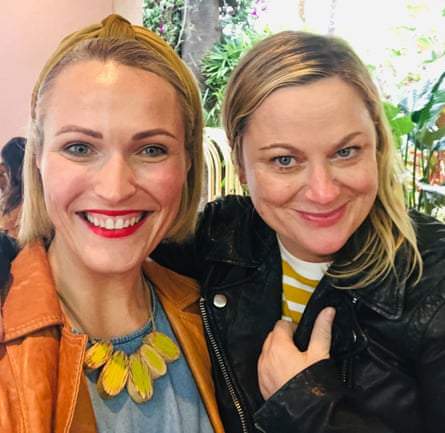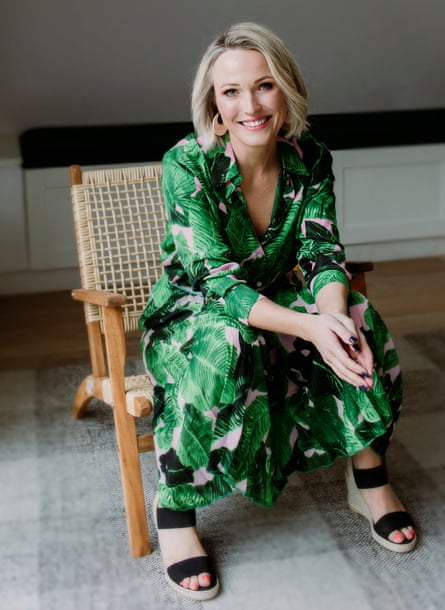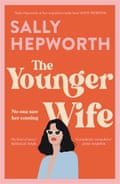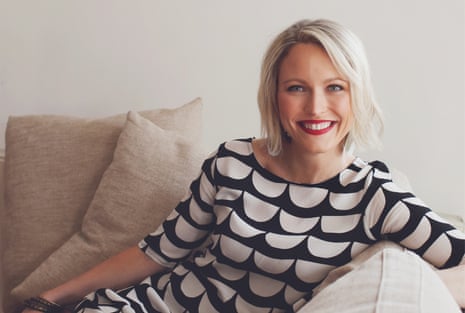At 6am on a crisp Melbourne morning in 2019, Australian author Sally Hepworth, still in her pyjamas, sat in her parked car in the garage to take a call from Amy Poehler.
The US comedy powerhouse was interested in optioning Hepworth’s latest New York Times bestseller, The Mother-in-Law – about a matriarch found dead and a family riddled with secrets – for television. It was a once-in-a lifetime opportunity, but Hepworth was plagued by two fears: her children walking in and ruining the moment, or ruining it herself.
“My agent said to me: ‘Don’t do that thing where you blurt, play it cool,’” Hepworth recalls. “But with someone like Amy, you lose your whole power.”
Cut to a few months later and Hepworth was meeting with the actor, comedian, producer and director over breakfast at the Beverly Hills Hotel in Los Angeles on her way back from a whirlwind trip to New York, where she was promoting her book on Good Morning America. “Amy came with wet hair, no makeup, and she was warm and personable” Hepworth says. Before long, she lost an internal battle and asked for a selfie.

“I couldn’t not get the selfie,” Hepworth says. “I just had to. She told me all the things she loved about the book. I hate the word surreal, but it was surreal.”
Despite a succession of pinch-me moments, Hepworth insists she was far from an overnight success. She describes faltering considerably in her early days, when she was writing on maternity leave after the birth of her first child.
“I was like the proverbial duck with furious legs under water, trying to make it,” she says. “There were several failed books even before my first book [Love Like the French] was published, and it was published in German. Only in German, and I am so so grateful, because I hate it so much.”
Since then, Hepworth has released a novel a year – all of them, remarkably, bestsellers. Buzz was building before her latest, The Younger Wife, was even released, with Australian sunglasses brand Sticks & Sparrow designing sunnies inspired by the book’s cover illustration and naming them after the main character, Heather Wisher. (Hepworth, who has very engaged Instagram followers, models a pair for me over Zoom.)
The Younger Wife, which features a hot water bottle stuffed with cash (inspired by the antics of Hepworth’s own great aunt Gwen), follows sisters Tully and Rachel Aston as they grapple with their father’s decision to marry the much-younger Heather after their mother, Pam, moves to a nursing home with end-stage Alzheimer’s. It’s an addictive, easy read, with idiosyncratic characters and, like all Hepworth’s novels, suspense at every turn.
Nowadays, she has a Davitt crime fiction award to her name (for 2020’s The Good Sister) and many comparisons to fellow Australian author Liane Moriarty.
“She’s the one that everyone wants to be compared to, so actually I’m very happy about it,” Hepworth says. “Our publisher knows I am obsessed with her and, when we talk, I always ask ‘How’s my best friend, Liane? Can I have her home address?’ And when Apples Never Fall came out, I emailed Liane to congratulate her, and I asked her to tell our publisher that I was standing outside her house. We just egg on our publisher.

“But you know, she is in my genre, so it’s natural for publishers to position newer authors in that vein – you know, every thriller writer is like Paula Hawkins, and every domestic suspense author is going to positioned as the next Liane Moriarty. But my Australian editor said that with this new cover design [Hepworth’s Australian publisher has repackaged her previous novels to match the latest release], it almost signals a step away to [my] own personal brand.”
And that brand is booming, if the fact her husband, Christian (who now has his own fanbase as Mr Sally Hepworth), recently quit his job as an accountant to become her full-time assistant is anything to go by. Hepworth has leaned into it, knowing it defies the housewife-author stereotype.
“I think there probably was a few housewife-type comments but I was really strong about not buying into them,” she says. “I either asked not to be asked about being a housewife, or I answered it in a way where I implied that unless you’re asking it of Trent Dalton, then you shouldn’t ask it of me.
“Christian and I are both passionate feminists, but I also want to be careful and say I was also once the primary carer of our children. We have both played every role in our relationship. We’re a partnership and we always have been.”
It seems to be working: Christian works on her website, reads her drafts, deals with the returns for her online clothes shopping and leaves Hepworth to focus on her “seasonal” approach to her job – writing a draft in three months, editing it in the next three months, and then working on a promotional cycle (accounting for an Australian release in November and an American release in April) and the “business” of writing, including invoicing, interviews, contracts and so on.
Hepworth says her first-draft routine is very regimented – she writes in 350-word bursts six times a day – a strategy she implemented when her confidence was low and 2,000 words seemed “too scary”. Editing, on the other hand, is an “ugly, gnarly process” that is far less regimented.

“Writing is still my favourite thing,” she says. “I struggle though the parts I don’t like – the bad reviews, the dip period where you feel insecure – but every time I am in that first-draft period, I love it. There is a craft, there is hard work, but it’s what I’m good at. I am terrible at sport, my parenting is very subpar and my editing is shocking, but creating characters with wisdom and truth, fostering empathy through telling stories, that makes me happy.”
The Younger Wife by Sally Hepworth is out now through Pan Macmillan Australia (A$32.99)

Comments (…)
Sign in or create your Guardian account to join the discussion